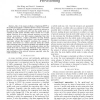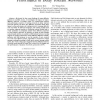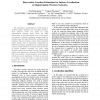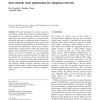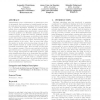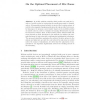VTC
2008
IEEE
14 years 6 months ago
2008
IEEE
— Mobile IP allows a mobile node to maintain a continuous connectivity to the Internet when moving from one access point to another. However, due to the link switching delay and ...
PIMRC
2008
IEEE
14 years 6 months ago
2008
IEEE
—One of the major problems of deploying RSVP in the mobile environment is called the advance resource reservation problem. If an RSVP reservation path is reserved in advance in t...
IROS
2008
IEEE
2008
IEEE
HybridExploration: A distributed approach to terrain exploration using mobile and fixed sensor nodes
14 years 6 months ago
— When an emergency occurs within a building, it may be initially safer to send autonomous mobile nodes, instead of human responders, to explore the area and identify hazards and...
ICCCN
2008
IEEE
14 years 6 months ago
2008
IEEE
—In mobile ad hoc networks, solving the standard problems encountered in fixed networks can be challenging because of the unpredictable motion of mobile nodes. Due to the lack o...
ICC
2008
IEEE
14 years 6 months ago
2008
IEEE
— Motivated by the recent findings of super-diffusive patterns in mobility traces, we investigate the impact of superdiffusive behavior of mobile nodes on contact-based metrics ...
FGCN
2008
IEEE
14 years 6 months ago
2008
IEEE
The localization requirements for mobile nodes in wireless (sensor) networks are increasing. However, most research works are based on range measurements between nodes which are o...
AINA
2008
IEEE
14 years 6 months ago
2008
IEEE
The main advantage of a wireless network is user mobility, which calls for efficient routing support at the network layer. An architecture combines hierarchical mobile IPv6 and ne...
SIGMETRICS
2009
ACM
14 years 6 months ago
2009
ACM
Disseminating a piece of information, or updates for a piece of information, has been shown to benefit greatly from simple randomized procedures, sometimes referred to as gossipi...
MOBILITY
2009
ACM
14 years 6 months ago
2009
ACM
We present the feasibility evaluation of a structured communication-oriented Peer-to-Peer (P2P) system being used in mobile environments in this paper. The different levels of chu...
PET
2009
Springer
14 years 6 months ago
2009
Springer
Abstract. In mobile wireless networks, third parties can track the location of mobile nodes by monitoring the pseudonyms used for identification. A frequently proposed solution to...

